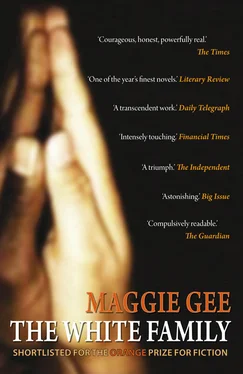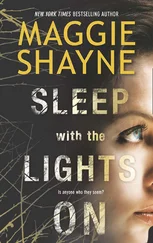‘George. Morning. All right, thank you. Well, more cuts, that sort of thing. I’ve just popped home to let in the plumber.’
‘Drains?’
‘No …’
‘Pipes?’
‘No …’
‘Is it your lav then?’ says Nosey Parker. ‘Windsor Drainage, next door. They’ll fix you up.’
‘Tap,’ says Lovey, and he goes a bit red. Wanker can’t even fix his own frigging washer! ‘ Guardian , please’, he says, very quick.
‘Dirk. Fetch Thomas a Guardian .’
‘They’re on the shelf,’ I say, outraged.
‘Not to worry, of course I’ll get my own … No news of your father, this morning, I suppose?’ And Lovey looks at me as if we’re best friends.
‘No.’ ( Guardian -reader! Gobbler! Pansy! I hate the voices of people like him. Loving themselves. Too bloody loud. Totally … self-competent.)
‘Regards to your family,’ Lovey says to me. ‘I’ll probably pop in to the hospital again tomorrow.’
‘Uhn,’ I grunt, not looking at him.
‘Regards to your sister. I didn’t say goodbye.’
‘She wouldn’t have noticed.’ One up to me.
And now he’s gone, he’s gone, thank God.
‘I thought you said only family was visiting?’ George’s eyes are like the eyes of a spaniel. Big, brown, bloodshot and bloody miserable.
‘Yes, but some people always push in.’
‘Your dad’s my oldest friend,’ said George suddenly. ‘My oldest … surviving friend, you know. Your mum knows that. She wouldn’t mind. We go back a long way, me and Alfred. Before you were thought about, young man.’
And the coughing swells, a great gale of it, as if he will burst, as if he’s exploding, as if what’s been hiding has to get out, as if he’s been holding it in too long, and now he will cough till there’s nothing left and the shop is covered with blood and phlegm.
Maybe it’s now. Maybe it’s time.
And I’ll sit and watch and do nothing to save him.
But no. Getting quieter. Calming down. Now I can hear the rain again, the hiss of rain as the cars go past. None of them stop. Roaring past us. Off to the shops that rake in the money. Doling their cash out at frigging Gigamart. Largeing it down the sodding West End. Putting on the dog in bloody Bond Street, flashing their cards for the wops and the Jews …
This is an English shop. What have they got against us?
Whenever it rained Shirley thought about Kojo. He said English rain was quiet, like tears.
He meant Shirley’s tears. She was his ‘quiet woman’. Quieter than his African loves. He had many women before he met me but it was me he married, me he loved .
Shirley dressed herself with elaborate care, though she was only going shopping. Leaving the house to escape the pain. Silks and wools of milk and honey that made her skin glisten rose and pearl … Oh Kojo once called me his pink pearl, and his pale pearl, and his –
Stop, stop.
Purse. Hanky. Cards. Umbrella?
It was the second time she had dressed that day. Jeans and jumper for breakfast with Elroy. He’d made her tea, then she made him breakfast. He left for the hospital at 8 a.m.
He never leaves without telling me he loves me. He isn’t a talker, but he always says he loves me –
I don’t know what to say to him.
Last Sunday I cooked him his favourite fried chicken and we sat together in the kitchen and talked. I said I could never marry again. (Once you’ve loved someone so completely …) But Elroy’s desperate to marry me. ‘We are living in sin,’ he says, quite straight. He’s twenty years behind the times — the Pentecostal church does that to you. I love Jesus as much as him, but I don’t think God minds about marriage. Love is patient, love is kind … He’s the God of Love, and He loves us all.
When it rained on Saturdays, we stayed in bed, Kojo and I, we loved to be naked, can that have been me, can life have been so good? Naked, in a nest of sheets, his beautiful warm slender body, curled round mine, stroking, playing, and then inside me, he spent hours inside me … Usually he’d worked till three in the morning, straining his eyes at that glaring screen, his big brown eyes always slightly bloodshot, then up at seven, racing, chasing — But at weekends he loved to lie in. I’d bring up our breakfast, we’d eat together, slowly, ravenously, playing around, jazz on the radio, rain on the window, the smoke from his fags curling up in the light, I liked the smell, it was part of the music, the smell of Kojo and our life together, how many cigarettes did I light for him? The curve of his lips with the tip between them, smiling at me, staring at me … His beautiful lips. So full, so firm, not tight and thin like English lips. He used to eat me with his eyes, he used to eat me till I came, I hardly knew my body before I met him. They say that black men won’t go down on you, that they just like pumping away all night, jump on top and get on with it, but it isn’t true of all of them, no more than any of these things are true, though Kojo could make love all night — (Elroy has never gone down on me, but Elroy is younger, less confident. He will, one day. When he loves me more. I go down on him, and it blows his mind.) But Kojo was an artist. Kojo loved me. Kojo found me. He found my joy, what was the word, the long French word, my jouissance , the word he used in his books for coming, the word he taught me, as he taught me to come.
No, I never came before I met Kojo. I never told him, but I never came. When we started, it seemed too big an admission, I didn’t want to give him so much power. But now I wish I had told him, thanked him. Thank you Kojo. Dear love, dear heart.
(Are you somewhere? Anywhere? Listening?)
My lovely love. My African love. Maybe he’s with his ancestors … He was westernized, he dismissed all that, but I think that part of him still believed it. He said he was a Marxist, but these things go deep. If he could be a Marxist and a Christian, he could be a Christian and believe in spirits, though he laughed when we went to visit his second cousin and found queer rubber balls in every room, and afterwards I asked him if Kwame had children, and he told me each ball stood for a different spirit, the spirits of the air and the wind and the forest. I thought it was a beautiful idea, but he claimed to think it ridiculous. ‘I left all that nonsense behind in Ghana.’
I hope he is with his ancestors. I can’t believe he is entirely lost.
Forgive me, Jesus, for thinking these thoughts. No one who sleeps in You can be lost.
We didn’t have children. He was sure we would. It fell slowly upon us, the heaviest sorrow. If I had his children, he would still be with me. I did conceive. Twice. Two boys. One lost at ten weeks, one at twelve. In the first years of marriage. Afterwards, nothing.
I knew nothing about Africa when I met him, I thought all black people were Africans. My dad hated black people, of course, and he called them ‘coloured’, so I did too, though whatever Dad hated I was ready to like, and I never knew ‘coloured’ was insulting till I went with Kojo and he told me not to say it. I asked him the difference between ‘coloured’ and ‘black’ and he said, ‘Right now you are blushing, Shirley. When you’re upset, you turn every kind of colour. Don’t you think white skins colour more than ours?’ It was another world, with another way of thinking.
Elroy’s family is Jamaican, though he was born in south London. That’s partly why Elroy is jealous of Kojo, because he was African, and so highly educated. West Indians don’t like Africans much and I always think it’s jealousy. Africans have their own names, after all. West Indians don’t. White people stole them. I felt so ashamed when Kojo told me West Indian names are all slave names. Slave owners stamping their names forever … and then there are the Africans who don’t like West Indians, ‘slave babies’. The worst insult.
Читать дальше












